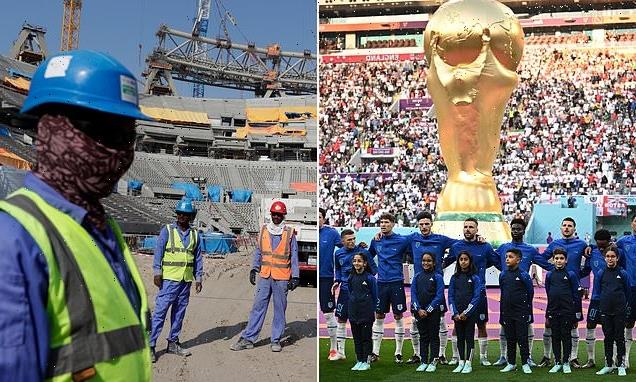
‘What message are we sending our students?’ Teachers slam schools showing the World Cup because of Qatar’s ‘appalling’ record on human rights
- Some staff ‘despised’ the move to suspend classes for the England game
- One in ten schools are thought to have shown the England vs Iran game today
- Others chose not to show England’s opening game because of ‘ethical concerns’
- Qatar in spotlight over treatment of gay people and poor working conditions
- Click here for the latest World Cup 2022 news, fixtures, live action and results
Teachers today said schools should not show the World Cup because of Qatar’s ‘appalling’ human rights record.
Some staff said they ‘despised’ the move to suspend classes for the England game, claiming it sent out the wrong message. One in ten schools are thought to have shown the match – but others chose not to because of ‘ethical concerns’.
Qatar has been in the spotlight over its treatment of gay people because homosexuality is illegal and punishable by prison. It has also been accused of allowing poor working conditions for migrant workers.
Many headteachers have chosen to show major matches in the past to stop pupils bunking off school. However some said that to do so this time would be ‘at odds’ with the work they had done on diversity.
Others said they would show the match but will have ‘age-appropriate’ discussions about the ethics of the tournament.
Teachers today said schools should not show the World Cup because of Qatar’s ‘appalling’ human rights record. Pictured: England singing the national anthem before their first game today
A survey by TeacherTapp suggested that just 9 per cent of schools showed the game yesterday. Mario Valerio, a drama teacher at the private Royal Russell School in Croydon, tweeted: ‘I vehemently despise the idea of schools showing the World Cup.
What message are we sending our students? ‘That some countries like Qatar have appalling human rights, and if you are gay, can be imprisoned or executed – but don’t worry, kids! The football is on! Stop. Just stop.’
Another teacher said: ‘We are showing the game on Monday in our primary school. I’m very conflicted. I love football but despise everything that Qatar is. Iran should have been thrown out of this World Cup for their violations against women. I hope the players use their platform to highlight this.’
Andy Byers, headteacher at Framwellgate School in Durham, said his school had taken the decision not to show the game.
He said told the Times Educational Supplement: ‘There are ethical objections to this World Cup, which is at odds with the work we have done on equality and diversity and, on a practical level, the logistics are too difficult to manage.
‘It also sends a poor message to students. Uniting as a community around big sporting or cultural events is important but I’m not convinced that this game is a big event.
‘The outcome does not determine our progression in the tournament, and the tournament itself is being played down in the UK because of ethical concerns.’
Dan Morrow, chief executive at Dartmoor Multi-Academy Trust, said his ‘firm view’ was not to show the game for operational, practical and ‘prevailing ethical considerations’.
Qatar has been accused of allowing poor working conditions for migrant workers. Pictured: Workers at the Lusail Stadium
Some said they would show the match but will have ‘age-appropriate’ discussions about the ethics of the tournament. Pictured: Workers stand in front of the Doha skyline
Caroline Derbyshire, chief executive of Saffron Academy Trust in Essex, said that although the decision would be down to individual heads, her sense was that with it being such a ‘controversial’ tournament, and the game coming at an early stage in the competition, ‘heads will not be wanting to engage enthusiastically with it’.
Some heads said they would show the game, but with ethical issues addressed. Dominic Arnall, chief executive of Just Like Us, an LGBT+ charity for young people, said the tournament was a ‘really key opportunity’ for school staff to open up the conversation about LGBT+ rights in their classrooms.
He added: ‘We’d really encourage teachers to chat to pupils about what this means for LGBT+ people and start a conversation.
‘Young people are likely to have questions about what’s happening and will probably really welcome the chance to see what’s going on outside the classroom, or perhaps in their favourite sport, to become an inclusive discussion that they can have in school.’
Source: Read Full Article


